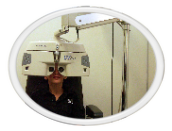Children - Maureen Leach OPTOMETRIST Ver11.0 as at 18/02/2016
Main menu:
- Home Page
- About Us
- Children
- Frames
- Latest Technology
- Contact Lenses
- Information
- Contact Us
Children
PARENTS, GUARDIANS, TEACHERS AND FRIENDS:
Watch for early signs of vision impairments such as amblyopia ("lazy eye"), strabismus. Early detection greatly increases chances that treatment will be successful and normal vision will develop. Children should be examined by an eye doctor during infancy and preschool years to detect potential vision defects.
For Professional Assistance:
Maureen Leach - (Principal) Dip.App Sc. (Optom) FAOA
Practising in all major areas of Optometry
Provider No 0237116W
___________________________________________________________________________________________________________________________________________________________________________________________
An average of 12 out of every 100 children are affected by binocular vision disabilities.

Early Examination:
This is particularly important if any member of the family has had amblyopic eye (lazy eye) or strabismus eye (deviating eyes). Testing of eye teaming skills (binocular vision and binocular depth perception) should be a part of every child's comprehensive eye examination. Find out which visual skills need to be tested as part of a complete pediatric eye exam.
Early Detection is Vital.

Early Detection:
Parents and teachers often have difficulty recognizing some visual problems because children don't necessarily know how or what they're supposed to be seeing, so it's unlikely they will clearly describe visual problems. A child who has never known normal vision or depth perception doesn't know what he or she is missing.
Watch for early signs of vision impairments such as Amblyopic or Strabismus

Watch for Early Signs:
Some binocular vision impairments (such as wandering eyes, deviating eyes, problems with convergence) are not easily detected by parents or teachers because the turning or straying of the eye(s) is NOT obvious or consistent. Some children's eye turns are intermittent (they come and go) and/or they are not easily noticed by the untrained observer. For example, some children's eye turns are visible only when they are tired, stressed or ill. A binocular vision problem deserves attention and treatment, even when the eye turn is only occasionally visible.